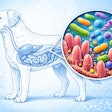
According to the Petfood Forum Europe presentation, "New Frontiers in Nutrition for Pet Health: The role of Nutrigenomics" by Dr. Peter Spring and Dr. Richard Murphy, nutrigenomics can be defined as how diet influences gene transcription, protein expression and metabolism, ultimately providing personalized nutrition for maintenance of an animal's health and the prevention of disease. The science of nutrigenomics seeks to provide a molecular understanding for how common dietary chemicals affect health by altering the expression and/or structure of an animal's genetic makeup. Nutrigenomics and the field of molecular nutrition is a very young one - the first dog genome was fully sequenced only in 2005 (the human genome was only fully sequenced in 2003).
According to Dr. Spring, an efficient way to do nutrigenomic testing is with DNA microarray technology. This technology evaluates the expression profile of thousands of genes within a single experiment and shows which genes are upregulated, downregulated or unchanged in response to a given formula or ingredient. Microarray techniques are also less invasive, provide more informative research and can determine many specific data, such as:
- The minimal, optimal and toxic concentration levels of nutrients
- The efficacy and toxicity of new ingredients
- The effect of nutrition on development, prevention and treatment of complex diseases
For example, in a joint health and cartilage degeneration microarray study, eicosapentaenoic acid proved to alter the action of a degenerative enzyme that causes cartilage degradation (Lorenz, et al. 2004). Another study (Kappel, et al. 2005) showed an improved fiber digestibility and a change in fecal microflora when the ingredient beet pulp was introduced into the digestive system. The stool consistency and quality improved, there was less unbound water and ammonia levels were reduced, according to the trial.
In another microarray study, this time on two groups of Beagles - one group young and the other old - cerebral cortex and hepatic samples were taken from the animals who were fed special high-fat/low-fiber and low-fat/high-fiber diets for 12 months (Swanson, Schook and Fahey). From the cerebral cortex samples taken, 38 diet-induced changes were noted to the Beagle's gene expression. In the young dogs fed the high-fat/low-fiber diet, there was an increase in genes associated with neurogenerative diseases in humans. In the geriatric dogs fed this same diet, genes associated with brain cell injury, inflammation and Alzheimer's diseases increased.
Selenium (Se) is a chemical compound being studied in the field of animal nutrigenomics. Selenium has already shown an effect on human health in regards to aging, cancer, heart attack, stroke, thyroid function, state of mind, immuno-modulation and Alzheimer's disease. Cancer is a large cause of death in pets over the age of 10 years (45 percent of all dogs older than 10 years of age die of cancer) and research regarding selenium's effect on the disease in companion animals has recently begun to be studied. In a series of trials performed on mice, key changes at the molecular level such as enhanced antioxidant status, reduced cellular stress and improved cellular performance were all noted after the introduction of organic selenium.















